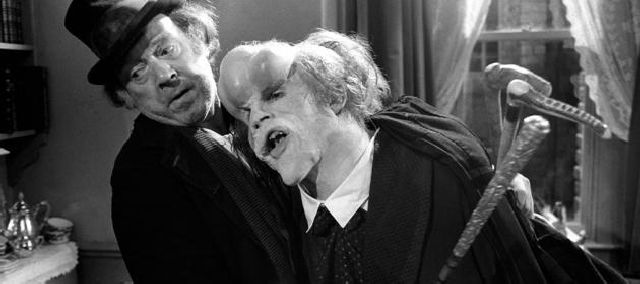The Elephant Man (1980) 
“I am not an animal! I am a human being! I…am…a man!”

Director: David Lynch
Cast: Anthony Hopkins, John Hurt, Anne Bancroft
Synopsis: A Victorian surgeon rescues a heavily disfigured man who is mistreated while scraping a living as a side-show freak. Behind his monstrous facade, there is revealed a person of intelligence and sensitivity.
David Lynch’s The Elephant Man bears as much resemblance to reality as those Hollywood biopics of the 1930s. Although the life of John Merrick (played here by John Hurt) was an inevitably difficult and short-lived one because of his affliction by Proteus Syndrome, he was never forced to perform as a sideshow freak against his will. Recognising that life as a sideshow act was his best chance of earning a living, Merrick willingly chose the life and, for the most part, was treated well by his employers and enjoyed the life. There’s no evidence he ever met the theatrical diva Mrs. Kendal (Anne Bancroft) and the character of Bytes (Freddie Jones) is a complete fabrication. It sort of makes you wonder why they made the film in the first place — perhaps it was to cash in on the public’s enduring curiosity when it comes to freaks of nature. If so, Lynch clearly shares some of the same exploitative proclivity possessed by both Bytes and the eminent doctor Frederick Treves (Anthony Hopkins) upon whose book the film is based.
Treves finds Merrick in a tawdry sideshow operated by Bytes. It’s not much of a show, really. A grubby curtain is parted to reveal a bare-chested Merrick sitting on a stool. On a command from Bytes he will rise and perform a slow turn so that the appalled audience can get a good look at the knobbly growths on his back. His face is hideously deformed, his head grotesquely enlarged and misshapen. If he were alive today, Merrick would be the subject of a one-hour TV documentary that would be swiftly consumed and forgotten. We may look down on the Victorian taste for freak shows, but we’re not much different from them, really. It’s just that now we don’t have the inconvenience of having to climb out of our recliners and leaving the house in order to see them.
Merrick’s make-up is very realistic, although the movie had to be made in black-and-white because it didn’t look too convincing in colour. You’d certainly never know that John Hurt was lurking somewhere under all those bumps. Hurt does a good job of evoking our sympathy with only limited dialogue, although it’s the somewhat dramatic situations into which he is plunged rather than his words and actions that move us. Apparently safe in his new home at the hospital in which Treves has installed him, Merrick suddenly finds himself back in the imprisonment of Bytes’ travelling sideshow when the hospital night porter (Michael Elphick) begins staging unauthorised night-time tours of Merrick’s living quarters for the drinkers at his local pub. Whisked off to France, where the inhabitants clearly don’t share the Brit’s thirst for sideshow freaks, Merrick must somehow find his way back home. It’s a bit like Oliver Twist, really.
Other than The Straight Story, The Elephant Man is probably the closest quirky director David Lynch has ever come to making a mainstream movie, and his unconventional perspective is considerably toned down for the occasion. The film does start with a strange scene that seems to suggest a bizarre link between Merrick’s condition and the fact that his mother was presumably attacked by an elephant while pregnant with him. And Merrick’s birth appears to be symbolised by a puff of smoke which is then seen to disperse in the final scene. That’s about as much visual eccentricity as Lynch allows himself, and the movie suffers as a result.
(Reviewed 6th August 2012)
httpv://www.youtube.com/watch?v=ye4YTZOq2fk
